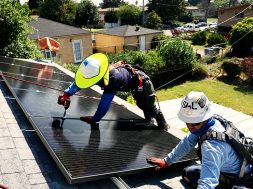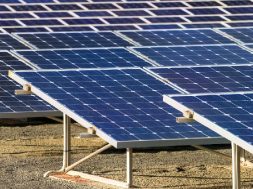
South Mumbai mosque opts for solar energy, slashes electricity bills by 67%
Jama Masjid at Kalbadevi is third mosque in south Mumbai to adopt solar energy, after Minara Masjid and Zakaria Masjid
The 200-year-old Jama Masjid in Kalbadevi, south Mumbai, is harnessing energy from the sun to power 70% of its electricity requirements, with an expected saving of 35 tonnes of carbon dioxide (CO2) a year.
This is the third mosque in south Mumbai — after Minara Masjid at Mohammed Ali Road and Zakaria Masjid in Masjid Bandar — to adopt solar energy. Of the three, its setup has the highest capacity to generate solar power, which has reduced its electricity bill from Rs60,000 to Rs20,000 — a saving of 67%.
A 31 kilowatt power (kWp) rooftop solar setup with 92 panels was installed earlier this year and sanctioned in October. It generates an average of 125 kilowatt-hour (kWh) electricity a day and 45,700 kWh annually. The setup will power electricity at the common areas, lights, fans, lifts and air conditioners. A two- bedroom apartment in Mumbai requires 8-10kWh electricity daily.
Spread across more than an acre, the two-storey quadrangular mosque at Janjikar Street is run by the Juma Masjid of Bombay trust. Built in 1775, it is home to a digitised library with rare manuscripts from as early as the 1890s. Members said this is one the main mosques for Sunnis and is managed by the Konkani Muslims. The mosque has also gone green and has a ten-foot-deep tank within its premises, home to different fish species and turtles.
“A mosque is a cultural centrepiece for a community and we were keen to set an example by going green, showing that we are open to embracing the future. We also wanted to instill a sense of responsibility towards the environement in younger generations,” said Nazir Ahmed Tungekar, chairman, Jama Masjid.
The Masjid is expected to recover the installation cost by 2021. “Apart from being cost-effective, our intention was to show devotees that they too, can install such a system at their homes and protect the environment,” said Najeeb Tungekar, manager (naazir) of the mosque.
The renewable energy will not only benefit the mosque, but also areas in the city where electricity is under-supplied. A net-metering system has been installed, which allows surplus power generated by solar to be exported back to the grid. Any deficiency is imported from the grid. At the end of a financial year, the supplier will charge the society only for its ‘net usage’.
“The mosque has shown not only Mumbai, but also the country how to adopt solar energy and go green,” said Muhammad Sohail Shaikh, chief operating officer, Green Power Projects Pvt Ltd that installed the project.














